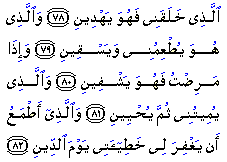Simple Guidance, Avoiding Sedition, Struggling to Sacrifice
Issue 284 » July 23, 2004 - Jumada-al-Thani 5, 1425
General
| Living the Quran |
Al-Shuara
(The Poets)
As we read the above statement of Prophet Abraham, we can clearly see how simple and straightforward were the teachings imparted to him by God. The more one reads the philosophers' attempt in trying to explain and understand life and existence, the more one is struck and impressed by the simplicity of divinely-revealed religious belief. Out of all the beings worshipped in the world, there was only One being in whose worship Abraham saw his own good - worshipping his own Lord, God, the Lord of the Universe. Abrahams explains in a few sentence the reasons why only God, the Lord of the Universe, ought to be worshipped:
Source: |
| Understanding the Prophet's Life |
| Avoiding Sedition on the Earth Thus, Islam has taught the father that his daughter is a "human being" before anything else. She is not a "commodity" to be offered and given to the one who pays more, as in the case of many ignorant and greedy fathers continue this practice until today. Source: |
| Blindspot |
Islam: A Path of Struggle Why must Islam be so emphatically linked with the idea of struggle? What has the one to do with the other? Cannot a person become a good Muslim without involving himself in a struggle that necessarily requires sacrifices? The answer is: No. And for very obvious reasons. Islam is not merely the confession of a faith which is made once in a lifetime. The faith is of cosmic dimensions. It requires a radical reorientation of entire life and the world. The confession is not merely verbal; it is an act of witnessing which must transform life into a living and continuing testimony of faith. You enter Islam by saying shahadah (bearing witness). But you can live in Islam only by constantly doing shahadah (al-Baqarah 2:143, al_hajj 22:28). Doing shahadah will bring you in ceaseless confrontation with false gods inside you, and with those outside you. It will also require a ceaseless striving to reshape self and society so as to attest to your witnessing. Being Muslim thus requires becoming Muslim. Becoming Muslim, after the seed of Iman has been sown in the heart, is a two-fold process: to summon one's own self and to summon mankind, to live under the sovereignty of One God alone. Both are inextricably linked together, both are to be taken up simultaneously. Summoning mankind is not a passive call. It is an active, dynamic process, a movement. It must wage Jihad with all available resources so that all false claimants to absolute rule are dethroned, oppression and corruption are over powered, and justice is established among mankind. Source: |
